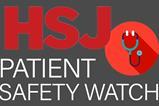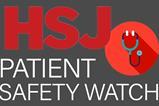HSJ is now hosting the Patient Safety Watch newsletter, written by Patient Safety Watch chief executive James Titcombe.
Good afternoon and welcome to the latest edition of the Patient Safety Watch newsletter.
It’s been another busy fortnight for patient safety news, so let’s get stuck in.
‘Not enough done’ on maternity safety
Donna Ockenden, who is investigating 2,000 cases of alleged poor maternity care at Nottingham University Hospitals Trust, has told The Sunday Times not enough progress on maternity safety has been made since she published her report into maternity care failings at Shrewsbury and Telford Hospital Trust: “We gave to the government and to the NHS a blueprint for a journey towards better, safer, more inclusive, compassionate maternity services. Some progress has been made but we are 18 months down the line and not enough has been done.”
Commenting in the same article, Birte Harlev-Lam, from the Royal College of Midwives, said: “Delivering safe maternity care should be a much higher government priority than it is…
“In the past 18 months, there have been two major reports into maternity safety. Despite this, we still haven’t met with the minister to discuss next steps – in fact, we’ve had meetings in the diary, only to have them cancelled at the last minute. Not once or twice, but five times, and we’re still waiting. What does that say about this government’s commitment to maternity safety?”
The parents of baby Poppy Russell – who tragically died in April 2021 following care failures at Telford – also gave an interview to the newspaper. Her mother Katie said: “We’re not just another sob story. I know people will find this emotional to hear and it is a horrific set of circumstances. But this is not just a case of one trust. This seems to be right across the UK. It is the most horrific thing that could ever happen to anyone.”
An inquest last month ruled that neglect contributed to Poppy’s death.
Poor maternity care at Hull Royal Infirmary risked babies’ lives, say mums
Following a damning Care Quality Commission report in April, which rated maternity care at Hull Royal Infirmary as “inadequate”, three mothers have bravely spoken to the BBC about their experiences.
One mother described how she had given birth at home but was subsequently taken to hospital. While there, she became worried about her baby’s condition.
“I noticed something was wrong. He was panting and his breathing wasn’t right,” she said.
Over the course of an hour, she said her concerns were dismissed by the newly qualified midwife, who said his breathing was “completely normal”.
“She kept reassuring me over and over that’s how babies breathe. I felt like I was drowning surrounded by lifeguards,” she said.
After being examined by a more experienced midwife, her son was rushed to intensive care and diagnosed with potentially fatal sepsis.
This story struck a personal chord; a timely reminder to all parents of newborn babies that if you’re worried that something ‘doesn’t feel right’ and remain concerned even after being reassured, please don’t be afraid to ask for a second opinion from a senior midwife or paediatrician – doing so might just make all the difference.
Bereaved families call for national investigation into maternity scandals
The Maternity Safety Alliance has written to health and social care secretary Steve Barclay, urging him to launch an England-wide statutory inquiry into repeated maternity care failings, ITV News has reported.
Signatories include Emily Barley, whose daughter Beatrice died in 2022 at Barnsley Hospital after staff failed to properly monitor her heart rate, and Jack and Sarah Hawkins, whose daughter Harriet died at Nottingham University Hospitals Trust.
The letter read: “Over and over again we hear that ‘lessons will be learned’ – and yet those same failings continue. And they don’t just continue in isolated corners of the NHS, they are present to some degree in almost every NHS trust in England, with the most serious kind of avoidable harm occurring everywhere.”
In other news this edition…
New children’s health warning system to be introduced
The NHS is rolling out a new early warning system for children being treated in hospital, designed to spot signs of deterioration by tracking and charting measures like blood pressure, heart rate, oxygen levels and levels of consciousness. There are four charts to cover different age ranges.
However, the new system will also better enable parents and carers to escalate their child’s care if they feel their condition is worse than their monitoring suggests. This is Martha’s Rule, named after 13-year-old Martha Mills, who tragically died in 2021 but would have likely survived had consultants moved her to intensive care sooner.
It comes after the patient safety commissioner, Henrietta Hughes, wrote to Mr Barclay with her recommendations for implementing the rule, after the health secretary instructed her to carry out a rapid review into how best to introduce the policy.
NHS national medical director Sir Stephen Powis said: “We know that nobody can spot the signs of a child getting sicker better than their parents, which is why we have ensured that the concerns of families and carers are right at the heart of this new system [which will immediately escalate] a child’s care if they raise concerns, and plans to incorporate the right to a second opinion as the system develops further.”
Important and very positive progress.
Watchdog raises concerns about needs of hospital patients with learning disabilities
A report from the Health Services Safety Investigations Body has warned that people with learning disabilities are still facing “persistent and widespread” safety risks when being cared for in acute settings.
In particular, the research highlighted issues with access to information on patients’ needs which would allow staff to make necessary adjustments and a lack of available support for staff who were not specialists in caring for those with a learning disability.
Clare Crowley, HSSIB senior safety investigator, said: “What our investigation shows is that where systems and processes do not support staff overall, an ‘unrealistic reliance’ is placed on individual staff members working within hospital wards.
“We heard from staff that they are trying their best for their patients but don’t always have the time to meet needs in the way they would like and are not always equipped with the specialist skills and knowledge they need to assess and care for people with learning disabilities.”
Patients with learning disabilities still facing solitary confinement
The Independent has covered the publication of House of Lords peer Sheila Hollins’ long-awaited report on long-term segregation for people with a learning disability and/or autism this week.
The report follows a four-year inquiry and found patients are being “warehoused” in hospital wards unsuitable for their needs.
Baroness Hollins said: “My heart breaks that after such a long period of work, the care and outcomes for people with a learning disability and autistic people are still so poor, and the very initiatives which are improving their situations are yet to secure the essential funding required to continue this important work.
“The humanity of people in solitary confinement gets forgotten. Their life story remains unknown. The use of solitary confinement affects the person’s identity to such an extent it causes what could be described as a social death.”
The Independent also covered the harrowing story of Nicholas Thornton, a 28-year-old person with learning disabilities and autism, who has been in and out of institutions for the last decade.
Dental complaints up by two-thirds in five years
The Parliamentary and Health Service Ombudsman has said the number of complaints it has received about NHS dentistry has increased from 1,193 in 2017-18 to 1,982 in 2022-23 – a rise of 66 per cent.
The number of complaints the ombudsman upheld also rose from 42 per cent to 78 per cent in the same time. Complaints upheld include a woman who was left in “excruciating” pain for almost two weeks after being burnt inside her lower lip during a root canal treatment.
Sharing some ‘good stuff’
The Clinical Human Factors Group is looking for new trustees. CHFG is a fantastic charity that works alongside public sector healthcare bodies to raise awareness of the adoption and application of human factors in healthcare delivery. The role description and how to apply details are here.
Better board oversight needed to save babies’ lives
OK, perhaps not a “good news” story, but this report from the Sands and Tommy’s Policy Unit highlights important issues and makes vital conclusions and policy recommendations. Essential reading for maternity leaders and those with patient safety/governance roles.
Patient experience: who is listening?
As the final share for this edition, please do read this timely blog from Dan Wellings, senior fellow at The King’s Fund. Dan looks at the story behind Martha’s Rule and the disturbing institutional themes around culture, hierarchy, power imbalances and defensiveness. As Dan writes, patients’ voices are “not being sufficiently valued. This has to change”.
As many of the stories in these newsletters show, patients must be heard, valued and included as equal partners in their care – when this doesn’t happen, the consequences can be fatal.
That’s all for this edition, please look out for our next newsletter on 24 November.
In the meantime, thanks for reading and please stay safe.
James Titcombe
































No comments yet